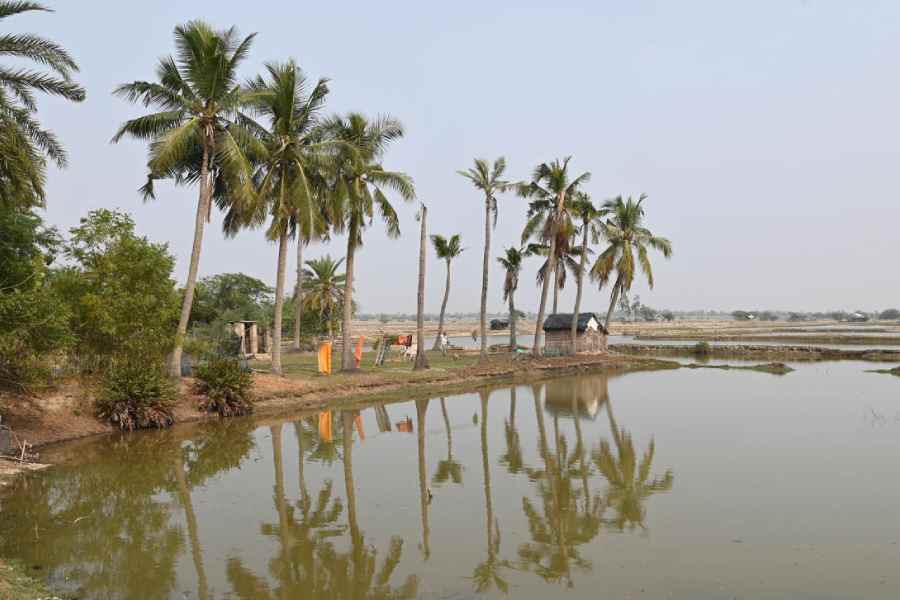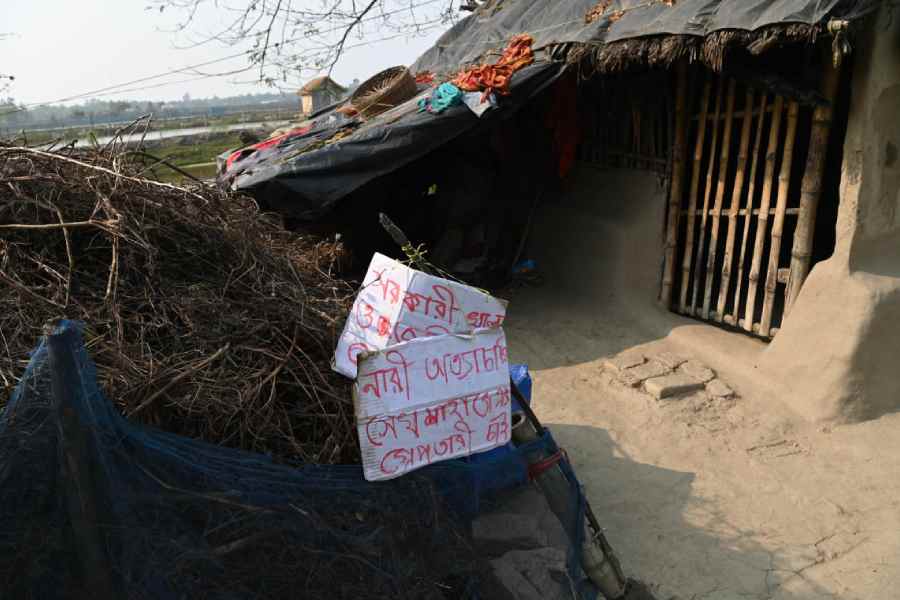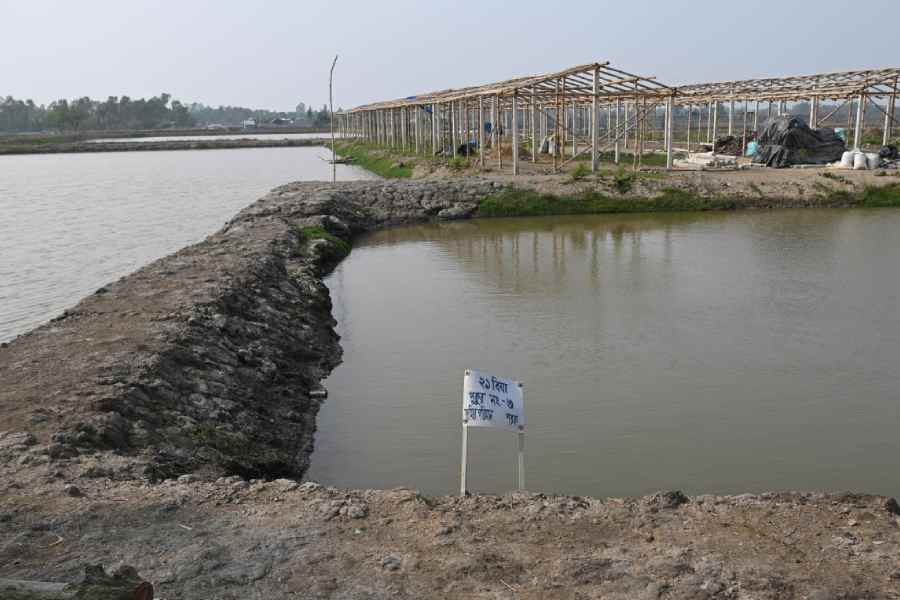Arjun Mondal, a 68-year-old farmer from Sandeshkhali in North 24-Parganas, used to till his family’s 1.5-bigha multi-crop land till four years ago. Today, he runs a tea stall near Sandeshkhali ferry ghat.
He was never solvent, but agriculture was enough to sustain the family of five and meet their modest needs. The farmer-turned-tea seller said he was hard-pressed to run his family since he was forced to switch profession. “Two of my sons are migrant workers... I live here with my wife and a physically challenged son. Survival on earnings from a tea stall is so difficult,” Mondal told this correspondent.
Land takeover
The change in Mondal’s status — from an independent farmer to a tea-stall owner — captures the underbelly of Sandeshkhali, a remote island in the Sunderbans.
“I belong to a marginal family and have been a farmer for the past 40 years. I still have the land on paper, but it is no longer mine as it became the property of Shibu (arrested Trinamul leader Shib Prasad Hazra),” Mondal said.
“I was not ready to hand over my small land parcel, but I was not able to bear the pain of being beaten black and blue by the kodaleyr bnaat (wooden spade handle), wielding which he and his cronies ran their writ in our area,” Mondal added.
Such stories of land grab have tumbled out in the open over the last fortnight following protests against some local Trinamul leaders who had allegedly created a reign of terror by forcibly taking away land parcels and committing crimes against women.
Sandeshkhali became the epicentre of a political controversy in the state after an attack on Enforcement Directorate officials during a raid at the home of Trinamul strongman Sheikh Shahjahan in connection with a PDS “scam”.
Although Sandeshkhali is a Hindu-dominated area with 36.45 per cent Scheduled Castes and 24.55 per cent Scheduled Tribes, many among the few Muslim residents of the island virtually echoed their Hindu brethren.
Amirul Ansari, a mason from Murshidabad’s Domkal who has been in Sandeshkhali for over 30 years, said the torture was not limited to forcible signing of lease documents.
“I don’t have land here but I saw what happened in the past three-five years. Those who were not willing to hand over their land even after pressure saw saline water pumped into their plots. I don’t want to participate in the politics going on here, but the charges are correct,” Ansari said.
The ED raids in the area to probe the PDS “scam” brought to light another “scam”, that of land grab, which, if true, can turn out to be an embarrassment for chief minister Mamata Banerjee, who stormed to power in 2011 riding an anti-land acquisition movement.
Rise of bheris
Although Mondal, a school dropout, could not properly calculate his actual income from cultivation, a farmer in Satjelia — another island in the Sunderbans — said a farmer with a 1.5-bigha plot could earn around Rs 90,000 a year, producing food grain and vegetables.
“It was disastrous for me after I lost the farmland. I would produce rice and it took care of my food needs. The surplus would rake in at least Rs 35,000 (annually). Forget about the income. The land had been tilled by my father, grandfather and their fathers before them. Why would I sell tea instead?” he asked.
“Now, Shibu and his cronies earn lakhs by turning my land into an artificial waterbody for pisciculture, and I toil away in my tea stall from before the crack of dawn to make ends meet,” he added.
Mondal alleged that despite an assurance of Rs 5,000 a month for the lease, he does not receive the amount for more than four months a year. He said he and others like him could not muster the courage to ask for the dues.
This newspaper spoke to at least a dozen people like Mondal, many of whom did not want to disclose their identity for fear of consequences. All of them echoed Mondal.
A group of young men took a break from their lazy afternoon chat near a culvert of No. 8 Majher Para to give this newspaper a feel of how the character of bigha after bigha of land had been changed to bheris (ponds for pisciculture). “Large tracts of fertile, multi-crop land where production of at least two crops annually of paddy and vegetables was a given have now become bheris,” said a youth.

A bheri at Sandeshkhali in North 24-Parganas. Picture by Bishwarup Dutta
Over 100 complaints
An official in North 24-Parganas said they had received over a hundred complaints of landgrab, with a rough estimate of total captured land not less than 750 bighas.
Sandeshkhali, an island among 102 (54 of them inhabited) on the Indian side of the Sunderbans, can be reached after travelling around 80km through Basanti Highway and crossing the Kalindi or two other rivers that separate the 22,000-odd inhabitants from the mainland. The Sandeshkhali gram panchayat has 16 electoral booths, with a 97 per cent Hindu population.
“We have been receiving complaints and will cross-check the allegations. We will certainly return the land to all the farmers who have complained to us. We have formed 10 teams that would be visiting the doorsteps of the complainants,” the official said.
Societal change
Samrat Sardar, a 38-year-old primary school teacher, said that although the trend of capturing land started during the Left regime, it had peaked in the past five-six years with the rise of a few leaders whom the villagers, especially women, now accuse of atrocities.
Another teacher at a high school, who did not want to be named, said the landgrab had invited a change in the social fabric. According to him, the close-knit homogeneous village society, in which the income differential among families was minimal, gave way to an unequal structure with two distinct segments — a few haves (who had political clout) and scores of have-nots.
“A handful of Trinamul leaders became ostensibly rich from the pisciculture money. These people and their cronies began behaving like monarchs or feudal lords... A new trend started as the ruling party leaders began forcing women to come to their party office even at midnight, and none dared to protest because of the helplessness of poverty and the remoteness of the area,” he said.
Surajit C. Mukhopadhyay, dean of social sciences at the Sister Nivedita University in Calcutta, echoed the teacher, adding that crimes against women are a typical expression of aggression following the capture of land or property.
“If you look at the history of war, you will see how the victorious group aggressively took possession of properties and targeted women. It matches what happened in Sandeshkhali, where allegations of grabbing land and sexually assaulting women came in the public practically simultaneously,” he said.
“First, they changed the character of the land and damaged the existing social equilibrium, and then they targeted women — a classic example of misogyny,” Mukhopadhyay added.

A hand-written poster put up by residents at Sandeshkhali in North 24-Parganas. Picture by Bishwarup Dutta
Midnight calls, assault
A 26-year-old woman from the island, who has lodged a police complaint alleging gang rape by arrested Trinamul leaders Hazra and Uttam Sardar, said she and several other women had to bear psychological and sexual torture for years.
“They had a few people who used to call us at night, even midnight. What did they gain from conducting meetings at midnight with women? If any of us refused to go there, our husbands would be summoned and beaten up with their weapon of choice — kodaleyr bnaat,” she said.
“We were forced to cook for them and do whatever they ordered for their entertainment,” said the mother of three, whose husband works as a migrant worker in a south Indian state.
The woman named Hazra and Sardar as the principal tormentors of women.
After the flare-up, Hazra, a former Trinamul block president, and zilla parishad member Sardar were arrested on charges of gang-raping a woman.
Role of police
The statement of the victim prompted questions about the role of the local Sandeshkhali police station, which is barely 700 metres from the party office where the accused Trinamul leaders used to allegedly assemble the women.
“The police? If anyone went with any complaint to the police station, the officers would ask them to go to Shibu Hazra for redress. Would you seek justice from the perpetrator of the crime?” asked a woman.
A middle-aged woman said their previously peaceful life changed in a span of four-six years since some politically influential people became rich in their locality.
“In our area, women never used to leave their homes after dusk.... But these leaders began calling them up around midnight. I never had to face such a situation, but my daughter and daughter-in-law had to,” said the woman in her late 50s.
While several women have now begun coming forward to lodge complaints, questions have arisen on why they had to remain silent for years.
A source claimed that the BJP is behind the sudden rise in complaints from the area, which witnessed a political vacuum after Shahjahan went into hiding on January 5.
“After Shahjahan fled, we convened a meeting among all women in our area and decided to launch a massive protest on our island and take on both the police and Trinamul. Otherwise, we wouldn’t have had the courage to speak out against those atrocious leaders,” said a woman, currently a BJP supporter.
Political past
Most of the people, especially the women, who have been pointing fingers at the ruling party leaders claim to have been Trinamul supporters in the past.
Sandeshkhali was a CPM bastion and even in 2011, when Mamata ascended to power after ending 34 years of Left rule, the CPM’s Nirapada Sardar — also arrested in connection with recent developments — had won the election. However, in the last two Assembly elections — 2016 and 2021 — Trinamul won the seat. Sitting MLA Sukumar Mahata is currently looking after the organisation following the arrest of the two leaders.
“Sheikh Shahjahan and his aides like Hazra earlier used to work for the CPM. After Trinamul came to power, they switched sides to remain ruling party leaders, and the degree of torture increased after this,” said a villager.
According to him, many Trinamul supporters began distancing themselves from the party because of the behaviour of local leaders. The rising discontent with the ruling party became clear in 2019, when the BJP started gaining, taking leads in various gram panchayats like Manipur, Sandeshkhali and Korakati though Trinamul nominee Nusrat Jahan won from Basirhat in the Lok Sabha elections.
War of words
Anup Kumar Das, a senior BJP leader in Sandeshkhali, said the true face of Trinamul had been exposed.
“Now the people have understood what Trinamul really is. Most of the people are joining us to consolidate the protests against Trinamul’s atrocities,” he said.
Trinamul leaders, however, said the BJP-RSS were making exaggerated claims to corner the state government.
“There may be some allegations and our government and party are jointly trying to address those. But it is not true, what the BJP has been pitching before you (the media). Our stand is clear. Anyone who has been deprived will get their land back and the police have already taken action on the women’s allegations,” MLA Mahata said.

